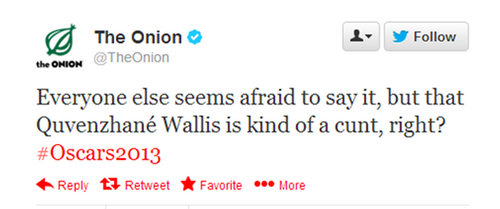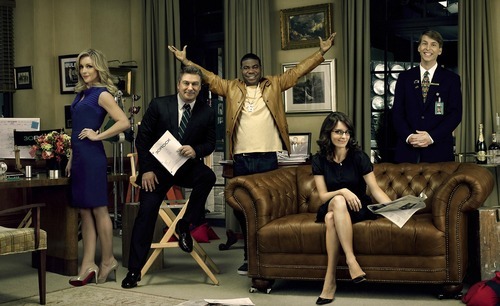
I don't like the term "outrage." I think it's a way of reducing a side to mere impulsive, emotional outburst. While there's certainly a segment of that in any controversial flare-up, it's not the main phalanx of the argument, and it's certainly not the part we should be addressing. The term I wish people would refer to more is "criticism" - because that's a word that's worth addressing. It's sensible to ignore outrage, but you're not a full-fledged artist if you don't at least consider with criticism.
(For the record, I personally didn't find The Onion's derogatory tweet to be worth the size of its controversy. It was certainly a misstep, probably shouldn't have been done, and poorly crafted - but not major to me personally. But also! I hate that we have to qualify these posts with a note about our moderate position, as if people with the strongest opinions are somehow less credible. That's a shame! But if it's what I have to do to get my imagined devil's advocate take this opinion seriously, then I will do it.)
I like to believe that any communication is usually a net positive, but it seems like a small positive when we're having a debate about the pros and cons of attacking children, with specificity, vulgarity and over mass media. This controversy has a lot of angles to it:
1. Shock Jocks Suck, Especially When The Power Is All Wrong
Here's The Onion's joke: Let's say something we aren't supposed to say. Or, in even more basic terms: Here's something naughty. That titillation you feel will often lead to laughter, even if it's just the incredulous kind that makes audiences go "Oooh!" I rarely get psyched up for it, but hundreds of comedians have made careers off of it, as they should! There is a demand for it. But doing that at the expense of a 9 year old girl, with vulgarity, over mass media - that's a steep ethical price just to get some retweets, don't you think? If not, if there is no such thing as an ethical price to you because all humor is fangless and has no effect on culture - that's swell too, but it's unreasonable to expect that of everyone else. It will come with backlash that you will just have to own, whether that results in losing sponsors, mainstream opportunities, or a bunch of angry @ replies.




